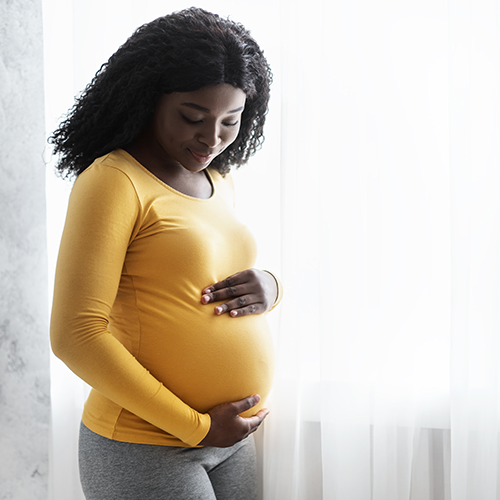Black Maternal Health Week (BMHW) is a national awareness and activism campaign sponsored by the Black Mamas Matter Alliance (BMMA) to advance health equity and maternal mortality for Black mothers.
BMHW is April 11-17, 2023, with the theme, “Our Bodies Belong to Us: Restoring Black Autonomy and Joy!” The theme was chosen, “…to continue to highlight and center culturally-congruent practices with a focus on Black Midwifery care and full-spectrum Black-led Doula care as sound, evidence-based solutions. Most importantly, these are practices and solutions that incorporate the true needs, wants and desires of Black women and birthing people,” according to BMMA’s website.
Black maternal care was the topic of a 2021 Children’s Minnesota podcast, Talking Pediatrics, where podcast guest host James Burroughs, senior vice president, government and community relations and chief equity and inclusion officer at Children’s Minnesota, talks with Dr. Lisa Saul, former president of the Mother Baby clinical service line. They discuss the stark maternal health disparities Black mothers experience and how we can approach maternal-fetal medicine with an equity lens to make sure that all women and all babies have the healthy outcomes they deserve.

Approaching maternal-fetal medicine with an equity lens
Dr. Saul discussed the impact of structural racism, socioeconomic inequalities and injustices for people of color and how they relate to a pregnancy and pregnancy outcomes. The build-up of negative experiences and environments create stressors that can have a physical impact on a pregnant mother and her fetus. Structural racism can bleed into all of our institutions, including hospitals, and impact the way that people of color are treated in those environments.
“We know that, by and large, the mortality that we’re seeing in our African American women comes from a lack of listening, a lack of empathy,” said Dr. Saul. “We have women who are trying to advocate for themselves and trying to speak up and say when things are not going well or don’t feel right. And oftentimes they’re getting brushed off or ignored and it can be at the expense of their life, or it can cause significant illness or significant consequences because of inattention.”
In 2020, Black women were most disproportionately affected with a mortality rate of 55.3 deaths per 100,000 live births, compared to 19.1 deaths per 100,000 live births and 18.2 deaths per 100,000 live births for white and Hispanic women, respectively, according to the Centers for Disease Control (CDC). Black mothers are more likely to suffer from PMADs (Perinatal Mood and Anxiety Disorders) like postpartum depression, in silence and without clinical help, according to the National Center for Biotechnology Information (NCIB).
Promoting inclusive priorities
The team at The Mother Baby Center continue to remain focused on promoting the inclusive priorities. We want every patient and their family to feel welcome, feel recognized for their uniqueness and know they are receiving expert care.
“No woman should go into a pregnancy, and certainly not go into a delivery room, fearing death,” said Dr. Saul. “That is not something we should still be talking about. And we are. We’re still talking about it in the African American community. We’re still talking about it in the United States at large. And this is something that can be changed. In health care, we have 100% of the obligation and responsibility to do what we need to do to change this. It is way past time.”
Listen to the podcast episode
Talking Pediatrics is a clinical podcast by Children’s Minnesota. Listen to the full podcast episode featuring Dr. Saul titled: “Equity actions: do all babies count? The dilemma of Black maternal health.”